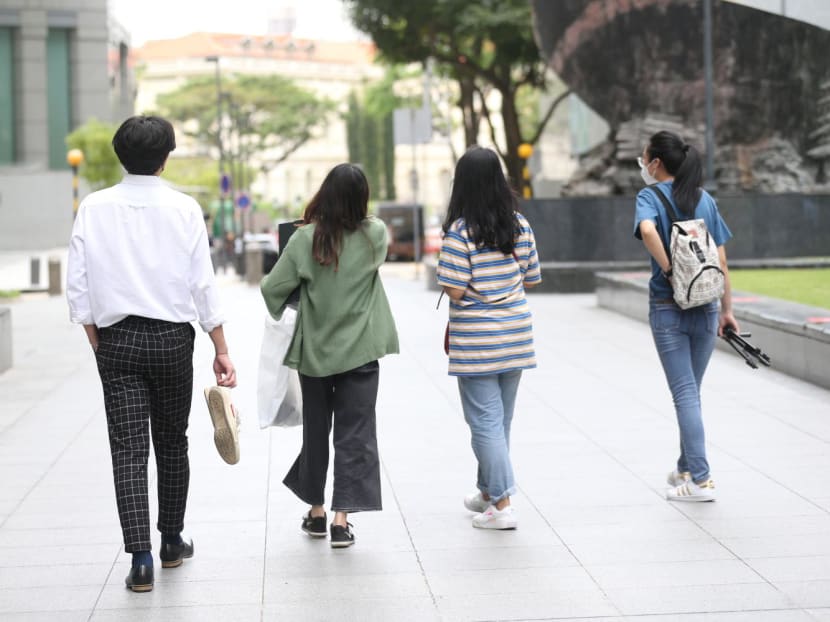Higher proportion of youth say quality of life lower post-Covid, in contrast to general population's positive sentiments: Survey
SINGAPORE — More youths aged between 15 and 19 reported that their quality of life and their ability to manage their mental health have dropped through the course of the Covid-19 pandemic as compared to the general population, a survey commissioned by the Ministry of Communications and Information (MCI) has found.

- More youths reported that their quality of life and their ability to manage their mental health have dropped through the course of the Covid-19 pandemic as compared to the general population
- The sentiment of the general population was more positive than that of youths, with seven in 10 reporting that their overall quality of life was the same or better in 2023 compared to 2019
- Other vulnerable segments, such as those with several dependents and the unemployed, were also less optimistic about their lives post-pandemic
- The findings are based on a survey commissioned by the Ministry of Communications and Information
- This suggests that the impact of Covid-19 restrictions on social activities was "more keenly felt by the young, especially teenagers", the ministry said
SINGAPORE — More youths aged between 15 and 19 reported that their quality of life and their ability to manage their mental health have dropped through the course of the Covid-19 pandemic as compared to the general population, a survey commissioned by the Ministry of Communications and Information (MCI) has found.
The survey results, which were released on Sunday (March 19), showed however that the sentiment of the general population was rosier than that of youths, with seven in 10 polled among the general public saying that their overall quality of life was the same or better in 2023 compared to 2019.
MCI released these findings a day before the Covid-19 White Paper is slated to be debated in Parliament. The online survey was based on responses of 1,052 Singapore residents aged 15 and above gathered between Jan 31 and Feb 6 this year.
The survey showed that young people were less optimistic compared to the general population:
- Thirty-eight per cent of youths aged between 15 and 19 reported a drop in their quality of life compared to before Covid, versus 28 per cent for the general population
- Thirty-seven per cent of youths said that their ability to manage their mental health was poorer in 2023, compared to 28 per cent for the general population
- Forty per cent of youths reported that their relationships with friends were poorer than before the pandemic, compared to 28 per cent for the general population
- Forty-nine per cent of them felt less able to pursue activities and hobbies, compared to 32 per cent for the general population
"This suggests that the impact of Covid-19 restrictions on social activities was more keenly felt by the young, especially teenagers," said MCI in a media statement on the survey.
GENERAL POPULATION POSITIVE ABOUT QUALITY OF LIFE
The survey painted a different picture for the general population, showing that 72 per cent of respondents felt their overall quality of life was the same or better in 2023, compared to 2019.
The 28 per cent who felt that their overall quality of life was worse were asked to rate 10 aspects of their current lives, such as the ability to manage mental health, have work life balance and pursue hobbies.
At least six in 10 of this 28 per cent rated these aspects the same or higher.
"This is suggestive of a general recovery," said MCI.
Among the overall results, 77 per cent of respondents reported that family relationships became stronger or remained the same over the pandemic, 82 per cent felt likewise regarding relationships with their neighbours, and 71 per cent regarding relationships with friends.
When respondents were asked to rate their overall quality of their lives now in 2023, 69 per cent of them rated it as “good” or “very good”.
Ratings of “poor or “very poor” were generally low across the 10 aspects of life that respondents were polled on.
For example, 72 per cent of respondents rated their relationships with family as "good" or "very good" compared to 7 per cent who regarded it as "poor" or "very poor".
About seven in 10 respondents also expressed confidence in the ability of the country's institutions, the community and themselves to manage future pandemics well.
For instance, 75 per cent of respondents were confident that Singapore will be able to get through a future pandemic, while 69 per cent will be mentally prepared to deal with it.
OTHER 'VULNERABLE' SEGMENTS LESS OPTIMISTIC
Other than youths, other more "vulnerable" segments as defined by MCI were also less optimistic about their lives post-pandemic.
For instance, respondents with several dependents, such as elderly or young children, were more likely to rate their overall quality of life now to be “poor” or “very poor” (18 per cent) compared to the general population (10 per cent).
Respondents who were unemployed also expressed less confidence about Singapore’s ability to get through another pandemic in the future (16 per cent) compared to the general population (7 per cent).








